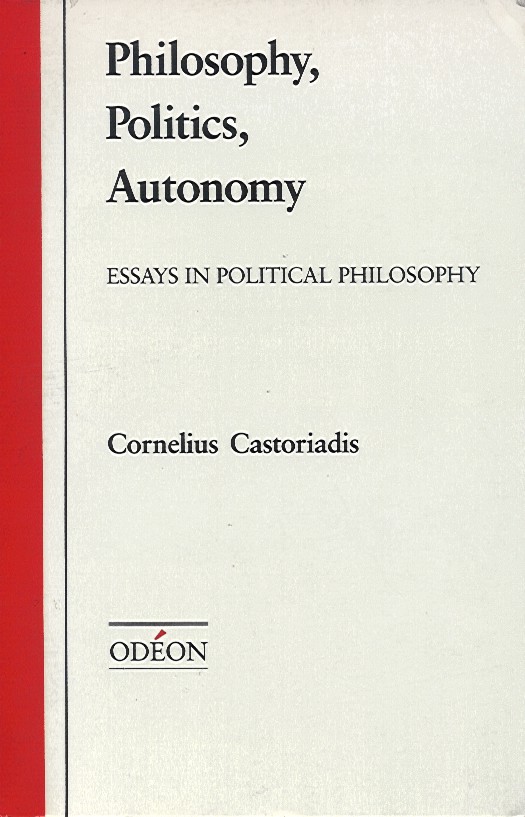DAVID AMES CURTIS: FOREWORD FOR THE CASTORIADIS READER
DAVID AMES CURTIS
27, rue Froidevaux 75014 Paris FRANCE TEL/FAX:
33 (0) 1 45 38 53 96
666 Main Street #305 Winchester, MA 01890 USA; TEL: 1-781-729-0523
CURTIS@MSH-PARIS.FR
TRANSLATOR'S FOREWORDS

Cornelius
Castoriadis, Philosophy, Politics, Autonomy. Ed. David Ames Curtis. Oxford University Press, 1991.
PREVIOUSLY EXCISED TEXT RESTORED FOR
PHILOSOPHY, POLITICS, AUTONOMY 'S 1989 FOREWORD
RESTORED TEXT No. 1; FIRST LINE OF TRANSLATOR'S FOREWORD:
It is with profound satisfaction, excitement and anticipation that we present
here a collection of the most recent and significant writings of Cornelius Castoriadis
on philosophy, politics and autonomy.
RESTORED TEXT No.2; END OF SECOND PARAGRAPH:
One searches with the greatest of difficulty to find any contemporary of comparable
stature.
RESTORED TEXT No. 3; EXPLANATION OF ORIGINAL SUBTITLE
CHOICE:
We therefore unabashedly subtitle this volume "essays in the self-transformation
of humanity." For, they
RESTORED TEXT No. 4; TWO MISSING PARAGRAPHS ON THE BOOK'S
POLITICAL-CULTURAL IMPORT:
This reaction is somewhat understandable when we consider recent neoconservative
attempts to revive a "core curriculum" based upon "Western values." These attempts
are themselves an authoritarian, hierarchal reaction against the project of
autonomy, as it was expressed by students during the Sixties in their radical
questioning of educational "relevance" as well as in their efforts to establish
at that time, in the face of corporate hierarchy, a self-managed educational
system. Certain "educators" now want to impose from above a canon of texts and
ideas (and a test of "cultural literacy"), believing that this will teach the
young the (lost) "values" of "the West," usually conceived as "Judeo-Christian"
in origin and nature. This ploy harks back (though with infinitely less sophistication
and ambition) to the original Great Books program; one of its instigators, Robert
Maynard Hutchins, President of the University of Chicago in the 1930s, declared:
This is more than a set of great books . . . . Great Books of the Western
World is an act of piety. Here are the sources of our Being. . . . Here is
the faith of the West, for here before everybody willing to look at it is
that dialogue by way of which Western man has believed that he can approach
the truth. (Quoted in George Steiner, "An Examined Life" [review of Harry
S. Ashmore's Unseasonable Truths], in The New Yorker, October
23, 1989, p. 143.)
How one can encourage unfettered dialogue and questioning (an expression of
our autonomy) through the imposition from above of a canon and by means
of a cultivation of "piety" and "faith" within a hierarchal institutional setting
(amidst Gothic buildings) is never explained. All that is lacking for today's
neoconservatives is an education Pope, a position to which U.S. Education Secretary
William Bennett apparently aspired until he graduated to the more prestigious
authoritarian post of "Drug Czar."
In other words, for those committed to the project of autonomy the neoconservative
position is beneath criticism--though we must recognize its true insight that
a society must impart its cultural legacy to its coming generations. We should
take issue, however, with the response on the part of many of today's students
and point out that the critique of education, begun in the Sixties, had lost
its way by the end of the Eighties. It is here in the realm of education that
Castoriadis's reflection about autonomy and the simultaneous birth of philosophy
and politics in ancient Greece (and rebirth in Western Europe) acquire their
highest interest and relevance and offer their greatest challenge to contemporary
thought.
RESTORED TEXT No. 5; CONTINUATION OF NOTE 3:
But to designate a cultural formation does not yet tell us anything about what
its significations are or how they are. Except in a trivial sene, the social
imaginary significations of a cultural formation, the "magma" of such significations,
have no biological (let alone racial) basis, nor can they be created by an individual
psyche. An illustration of this point can be found in my Foreword to Castoriadis'
Political and Social Writings (see note 1 above), where I mention the
role of improvisation in the formation of jazz, a "mulatto" art form (and, by
implication, of a "mulatto" American culture, which remains, for the most part,
unacknowledged). "Whiteness" and "Blackness" are social imaginary signfications,
figures that cannot be unambiguously and univocaly assigned or imputed to specific,
designatable, separable individuals in any sort of exhaustive way (even though
this is how the terms are most often employed). Such a conclusion is, of course,
anathema to racist opponents of "miscegenation" or social "race mixing," just
as a similar conclusion concerning "maleness" and "femaleness" would be to a
confirmed and self-satisfied misogynist (or misanthropist). In Chapters 3, 4
and 5 of the present volume, Castoriadis explores the inadequacies of common
conceptions of "social theory" in coming to terms with the unique domain of
the social-historical.

